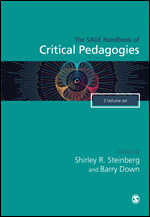2018 School Spending Survey Report
The SAGE Handbook of Critical Pedagogies
SAGE.
3 vols.
Mar. 2020.
1,752p.
ed. by ed. by Shirley R. Steinberg & Barry Down.
ISBN 9781526486455. $615.
REF
COPY ISBN
VERDICT Most appropriate for advanced students, think tank members, and scholarly researchers.
RELATED
ALREADY A SUBSCRIBER? LOG IN
We are currently offering this content for free. Sign up now to activate your personal profile, where you can save articles for future viewing




Comment Policy:
Comment should not be empty !!!